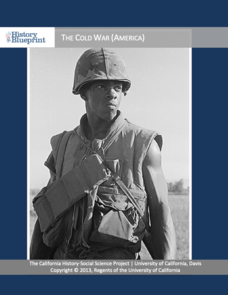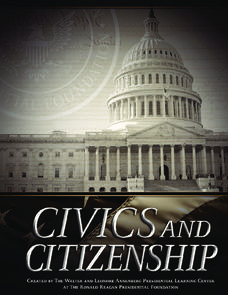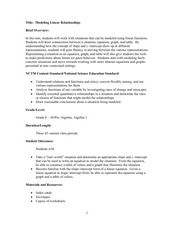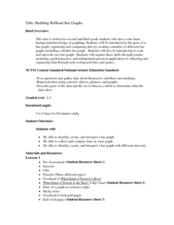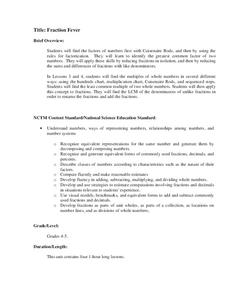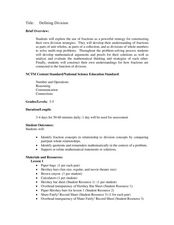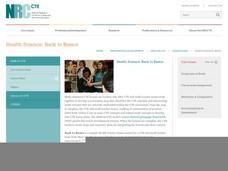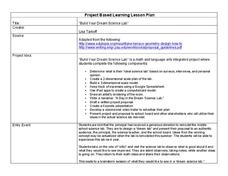Population Connection
Where Do We Grow from Here?
Did you know that the population is expected to grow to 11 billion by 2100? The resource serves final installment in a six-part series on the global population and its effects. Scholars interpret data from the United Nations about the...
Humanities Texas
Primary Source Worksheet: Excerpt from Reagan's Speech to the National Association of Evangelicals
Ronald Reagan's 1983 speech to the National Association of Evangelicals (also know as the "Evil Empire Speech") offers readers with an opportunity to practice their skills at reading informational text, specifically primary source...
University of California
The Cold War (America)
The Cold War—with its roots in World War II—impacts the world today. Using an extensive curriculum, scholars consider its impact through primary sources, including speeches and propaganda, as well as other skills-enhancing activities. An...
New York City Department of Education
Egypt
This six-week unit encompasses all subjects with a focus study on world history and the development of ancient civilizations. As gifted and talented students dive into the interesting yet challenging topic of Egypt, they...
DocsTeach
Analyzing a Photograph of Clara Barton
Just who was Clara Barton? Using an archive photo from the National Archives, class members consider the legacy of the founder of the American Red Cross. The activity includes the photograph, along with prompts to help young scholars...
Humanities Texas
Primary Source Worksheet: Franklin D. Roosevelt, First Inaugural Address
Young historians will learn not to fear primary source materials (or fear itself, for that matter) thanks to this resource that uses Franklin D. Roosevelt's March 4, 1933 Inaugural Address to model how to conduct a close reading of such...
Los Angeles County Office of Education
Assessment for the California Mathematics Standards Grade 2
Test scholars mathematic skills with an assessment addressing addition, subtraction, multiplication, place value, measurement, geometric shapes, expanded notation; and their ability to compare numbers, write number...
Curated OER
Strike a Pose: Modeling in the Real World (There's Nothing to It!)
Adjust this lesson to fit either beginning or more advanced learners. Build a scatter plot, determine appropriate model (linear, quadratic, exponential), and then extend to evaluate the model with residuals. This problem uses real-world...
K12 Reader
What's the Purpose? FDR's Pearl Harbor Speech
FDR's December 7, 1941 address to the nation is the focus of a reading comprehension exercise that asks middle schoolers to read an excerpt from the Pearl Harbor speech and determine the president's purpose.
National Woman's History Museum
Women of Wonder: Who Do I Admire?
Celebrate superwomen during Women's History Month with a lesson that showcases a variety of female role models. Following a whole-class discussion on superheroes, role models, respect, and admiration, scholars listen to several...
Australian National Schools Network
Civics and Citizenship
What is a good citizen? Here is a fantastic unit of ten lessons that will thoroughly cover the concept of civics and citizenship in your class. Examples of activities include learning stations, primary and secondary source analysis of...
Curated OER
Modeling Linear Relationships
Students graph lines using the slope and y-intercept. In this algebra lesson, students create data using tables and equations. They use their data to make predictions and draw conclusion.
Curated OER
Building Brilliant Bar Graphs
Everything you need for a mini-unit on bar graphs is included in this lesson plan! It outlines three lessons and includes worksheets. Learners taste pretzels, shoot baskets (switching off hands), and grab candy, graphing results...
Facing History and Ourselves
Life for German Youth in the 1930s: Education, Propaganda, Conformity, and Obedience
The German youth faced an onslaught of propaganda when they went to school, thanks to the Nazi regime led by Hitler during World War II. Pupils relate their education experiences to German youth by analyzing primary source readings,...
Curated OER
Exploring Equivalent Fractions
An extensive lesson explores equivalent fractions and is intended for three 60-minute periods. Young mathematicians compare and order fractions with like and unlike denominators. Included are worksheets, assessments, and answer sheets;...
National Security Agency
Fraction Fever
This unit on fractions allows for upper-aged elementary learners to explore ways to find the greatest common factor and least common multiple of two numbers. Ultimately, young mathematicians will be able to identify equivalent fractions,...
Chicago Botanic Garden
Causes and Effects of Climate Change
Wrap-up a unit on global climate change with a activity that examines the causes and effects of climate change. Learners fill out a chart that represents what they think causes climate change—natural and human-based—and what they think...
Curated OER
Treaties
Students explore Canadian maps. In this map skills and Canadian history lesson, students locate reserves that originated from treaties made while establishing the Saskatchewan First Nation reserve communities. Students research these...
Curated OER
Defining Division
Upper graders explore division through fair-shares. They will review fair shares and fractions as a segway into division. They start by playing "Share Fairly" game and create mathematical arguments for solving problems. Manipulatives and...
National Research Center for Career and Technical Education
Health Science: Back to Basics
This lesson focuses on unit conversion, proportions, ratios, exponents, and the metric system. Discuss measurement with your math class and demonstrate how to solve several health-science word problems. Give learners a chance to visit an...
Curated OER
Adding Polynomials with Algebra Tiles
Students practice adding polynomials using algebra tiles. Students view a PowerPoint presentation in which they are introduced to the concept of modeling polynomials using a scaled down version of algebra tiles. Students walk through...
Curated OER
Deciphering Word Problems in Order to Write Equations
Help young mathematicians crack the code of word problems with this three-lesson series on problem solving. Walking students step-by-step through the process of identifying key information, creating algebraic equations, and finally...
Curated OER
Build Your Dream Science Lab
Would your ideal science lab be filled with bubbling beakers and zapping Tesla coils? Or would it contain state-of-the-art computer technology and data analysis? Dream big with an innovative lesson that connects math and language...
Chicago Botanic Garden
Recognizing Change (Observation vs. Inference)
What is the difference between making inferences and making observations? Young climatologists refer to a PowerPoint to make observations on each slide. They record their observations in a provided worksheet before drawing a...


